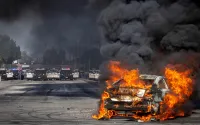16 August 2006Michael Schwalbe
Military service was a rite of passage into adulthood for males in my family. My grandfather and two uncles served in the navy. One uncle served in the air force. And my father spent three years in the army. As a boy, it seemed natural that I too would enlist when I finished high school. The only question was, Which branch? Then Vietnam came along.
I was fourteen when four students were shot dead by National Guard troops at Kent State University in May of 1970 during a protest against the Vietnam War. At that time I had no clear idea of what was going on in Vietnam or why people were protesting. My concerns that summer ran to baseball, fishing, and playing along the Lake Michigan shoreline. Vietnam was just words and pictures on TV.
But somehow Kent State pierced my boyhood shell. As I recall, my parents were not sympathetic to the students. "The students shouldn't have been there, and the troops felt threatened," one adult in my family said. I wasn't sure what to think. It seemed to me, having attended a strict German Lutheran grade school, that students ought to be attending classes and studying, not rioting. On the other hand, I was pretty sure that no one deserved to be killed for exercising their free speech rights while marching across a campus.
I started high school that fall, and while I didn't hang out with an especially political crowd, I began to pick up, perhaps from older students, a more critical vibe about Vietnam. That was the first time I became aware that some people thought the war was based on lies. Lies about the Bay of Tonkin, about the legitimacy of the South Vietnamese government, about the civilian death toll, and about the motives of U.S. government leaders.
Not that this radically affected my thinking. At that time I had no way to figure out where the truth lay amidst the competing views that surrounded me. The adults in my family, as far as I could tell, supported the war out of reflex patriotism. Coming from a working-class family, I also shared the anti-elitist, anti-privilege sentiments behind the demand, wielded against student protesters, to love America or leave it. Merle Haggard's "Okie from Muskogee" resonated more strongly with me than Neil Young's "Four Dead in Ohio."
The views among my high school friends were also mixed. Some despised Nixon and opposed the war. Others were insufficiently bothered by Vietnam to be deterred from seeking admission to the U.S. military academies. One friend went to Annapolis, another to West Point, and another to Colorado Springs. Smart, serious guys. All of them National Merit Scholars.
What astounds me now is that even with the war and protests going on in the early 1970s, and all of us within a couple years of draftable age, we still didn't pay much attention. The war, for all its prominence in the media, was not a main topic of our conversation. If it came up, it was usually because someone had a brother or cousin who'd been drafted, or who'd been killed, or who'd just been discharged. We weren't dissecting the war as a matter of right or wrong foreign policy. Nor were we talking in any serious way about what it would mean to be personally involved. As the teenage male products of U.S. culture, we were not equipped for that kind of conversation.
My uncertainty about military service lasted until the fall of 1973, when an army recruiter visited my high school. The recruitment pitch, as I recall, involved officer training, a commission, a four-year stretch, and then a full ride through college. It sounded like a good deal, especially since I wanted to go to college but wasn't sure how to pay for it. If Vietnam crossed my mind as a reason not to enlist, I don't remember having that thought. Besides, wasn't that mess over with?
Later I talked to my dad about the recruitment offer. I expected him to be pleased that I was even considering it. Not only would I be carrying on the tradition of military service in the family, but I'd do so as an officer, and get my college paid for. I also had the impression that my father enjoyed his time in the army. He never said a bad word about it. So I was surprised when I told him about the offer and he said, with unusual directness, "Don't do it."
What I don't remember is him saying exactly why I shouldn't do it. The impression I retain, thirty-six years later, is that he thought the recruiter's promises were untrustworthy, that the risks were too great, and that things were unlikely to turn out well. I also retain a strong impression of caring behind his advice. Maybe that's why I can't remember exactly what he said. He was not the kind of man who would have articulated his caring explictly, and so he said it in code.
Any lingering thoughts about military service were extinguished before I'd finished my first year of college. Nearly everyone I met there was critical of the Vietnam War and of how U.S. leaders had conducted it. The most credible critics, to my mind, were the many veterans on campus at that time. Every Vietnam veteran I met told a version of the same story: the war was horrifically cruel and wasteful; most of what the military brass and U.S. politicians said in defense of the war was bullshit; the Vietnamese had driven the French out in the 1950s, and now they wanted the U.S. out, so they could run their own country. One other thing the vets had in common: they had known none of this when they enlisted.
Other vets silently testified to the horrors the rest of us could only imagine. These were the guys who lived mainly in their own heads, moving through campus space with seemingly little connection to the world around them. They were scary, and best avoided when they drank. It seemed obvious to me that only an idiot, or someone who didn't know any better, would want to go through whatever had so badly rattled their minds.
I am fortunate in that I can't say what it's like to be a civilian or a combatant in a war zone. But in the years since I was an undergraduate I have studied violence, the myths of manhood, crimes of obedience, and geopolitics. So what I can say, I hope, are some things that might make young men less vulnerable to the seductions of war and to the pitches of military recruiters. Had I been in a position to do so, this is what I might have told the young men whose ignorance of history was exploited to make the Vietnam War happen.
Recognize, first of all, that modern war kills more civilians than soldiers. It used to be said that rich old men start wars, while the young and the poor fight and die in them. That's still largely true. But now it's not male soldiers who are most of those being maimed and killed. Forget glorious cavalry charges and heroic infantry battles. On average, ninety-percent of the casualties are women, children, and the elderly. This makes all modern wars crimes against humanity. To join the military is to put yourself in a position where you will be forced to be complicit in these crimes. This alone is sufficient reason to refuse to participate.
The second lesson is that being forced to be complicit in butchering innocent people creates a strong incentive to justify doing so. Military training will aid this process. It will teach you to value the lives of your fellow soldiers over those of the "enemy." Nationalism and racism will add to the mix. Eventually, you will be able to see other human beings as slopes, gooks, or hadjis -- all deserving the same moral consideration as roaches. If you don't do this, you won't be able to live with yourself. What the military will demand of you, in other words, is a diminishing of your own humanity so that you can ignore the suffering of others. It will not make you all you can be. It will try to make you less than a human being should be.
Combine dehumanization of the enemy with the inevitability of civilians being in harm's way and you have a recipe for atrocities. My Lai was not an aberration. Nor, more recently, were Abu Ghraib, Haditha, Fallujah, Ishaqi, or Qana. What happened in these places is the logical outcome of racism, nationalism, military conditioning, and the exigencies of violent conflict. Those who run with the dogs of war are likely to grow fangs.
A third lesson is that the military will try to crush your moral autonomy. The military can't function as the kind of organization it is if soldiers think for themselves about what's right and wrong. While military and international law say that soldiers are not obligated to obey illegal or immoral orders, this abstract right of refusal means little in practical terms. If military personnel were in a position to study international law and act on their own reasoned judgments of what's legal and morally correct, there would have been no U.S. invasion of Iraq.
In reality, you will be expected to obey orders under penalty of being imprisoned, and, most compellingly, under penalty of seeing your buddies hurt or killed. So you will forgo thinking for yourself and do as you're told. This is the opposite of being treated like a responsible adult. The military will try to fool you about this condition of infantilization by wrapping it in the rhetoric of machismo. You may thus be drugged by your own testosterone into believing that you are a real man, tough and independent, rather than someone else's expendable tool.
A fourth lesson, for would-be soldiers and civilians alike, is that most of what you will be told about the need for violence and killing will be lies. The critics of the Vietnam War turned out to be right. We were lied to at every turn. Then as now.
As historian Howard Zinn recounts, U.S. politicians have always lied to justify imperialist wars. Given this pattern of deception, and given the enormity of what's at stake, skepticism and thinking for one's self are not only warranted but imperative. Of course, if you refuse to accept at face value what rich men tell you about the need to kill others to preserve your "freedom," you will be unfit for military service. You will be better fit, however, to act as a citizen in a democratic society and as a member of a world community.
Another lesson is that there are more honest and genuine ways to uphold human freedom. To work for social justice is to expand people's freedom to develop their potentials. To expose the lies of the powerful is to expand people's freedom to make informed choices. To promote democracy is to expand people's freedom to participate in shaping society. To work for a clean environment or universal health care is to promote the freedom to live without being the victim of corporate profit-seeking. To oppose gratuitous war is to help create the peace upon which these other freedoms depend, at home and around the world.
A final lesson is that wars can't happen without obedient soldiers. The Vietnam War failed in part because too many people, soldiers and civilians, began to see through the lies and think for themselves. In turn, they became unmanageable by political, economic, and military elites, who then realized they had to change course. The result was not a loss for the United States, but a small victory for the spirit of democracy. In the case of Vietnam, this came late and at a terrible cost. The size of the bill that comes due for the U.S. invasions of Afghanistan and Iraq will depend on how soon the young people who now sit on the edge of war learn the lessons it always teaches.
Michael Schwalbe is a professor of sociology at North Carolina State University. He can be reached at [email protected].






